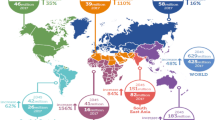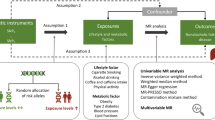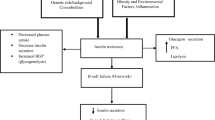Abstract
Diabetes is a socioeconomic burden worldwide as well as in Pakistan. International Diabetes Federation reported 7 million cases of diabetes and 86,384 deaths due to diabetes in Pakistan in 2015. Transcription factor 7 like 2 is a transcription factor encoded by TCF7L2 gene and regulates several physiological processes in the cell. The aim of the current study was to determine the prevalence of two TCF7L2 gene polymorphisms and analyze its effect on various anthropometric and biochemical parameters in a Pakistani cohort. We collected 926 samples, 500 healthy controls (fasting blood sugar < 99 mg/dL, random blood sugar < 126 mg/dL) and 426 cases with diabetes (fasting blood sugar > 99 mg/dL, random blood sugar > 126 mg/dL). The genotyping was done by RFLP-PCR and serum biochemical parameters were determined. The genotyping results of rs7903146 by RLFP-PCR showed the allelic frequency of C = 0.64 and T = 0.36 in controls while C = 0.59 and T = 0.41 in cases and genotypic frequency CC = 43.2%, CT = 41.6%, and TT = 15.2% in controls while CC = 34.03%, CT = 49.06%, and TT = 16.91% in cases. The minor T allele appeared to be a risk allele (OR = 1.25, CI = 1.03–1.51, p = 0.016), i.e., it increased the risk of diabetes in the selected study subjects. The genotyping results of rs12255372 showed allelic frequency G = 0.75 and T = 0.25 in controls while G = 0.63 and T = 0.37 in cases and genotypic frequency GG = 54.2%, GT = 42.2%, and TT = 3.6% in controls, while GG = 40.14%, GT = 46.24%, and TT = 13.62% in cases. The minor T allele appeared to be a risk allele for this SNP as well (OR = 1.77, CI = 1.44–2.16, p = 1.9 × 10−8). The biochemical parameters and general characteristics were checked for association with the TCF7L2 variant rs7903146, showed no association with all tested parameters. While rs12255372 had significant association with fasting plasma glucose, triglycerides, HDLC, LDLC, and leptin, but no association with total cholesterol, age, height, weight, and BMI. However, the multivariate analysis showed significant association of lipid parameters only when homozygous risk genotype of rs12255372 co-existed with all genotypes of rs7903146. In conclusion, the polymorphisms in TCF7L2 gene can increase the susceptibility to diabetes and the effect may involve modulating certain serum traits.
Similar content being viewed by others
References
Kaul K, et al. Introduction to diabetes mellitus. In Diabetes. Springer; 2013. p. 1–11.
Bahadar H, Mostafalou S, Abdollahi M. Growing burden of diabetes in Pakistan and the possible role of arsenic and pesticides. J Diabetes Metab Disord. 2014;13(1):117.
Cheng P-W, et al. Wnt signaling regulates blood pressure by downregulating a GSK-3β-mediated pathway to enhance insulin signaling in the central nervous system. Diabetes. 2015. https://doi.org/10.2337/db14-1439.
Musavi Z, Azarpira N, Sangtarash MH, Kordi M, Kazemi K, Geramizadeh B, et al. Polymorphism of Transcription Factor-7-Like 2 (TCF7L2) gene and new-onset diabetes after liver transplantation. Int J Organ Transplant Med. 2015;6(1):14–22.
Lu X, et al. TCF7L2 gene polymorphisms and susceptibility to breast cancer: a meta-analysis. Genet Mol Res. 2015;14(1):2860–7.
Strom A. Insights into extrinsic and intrinsic signals controlling murine pancreas development, growth and maintenance. University of Geneva; 2007.
Olausson J. Studies on microcirculation in insulin resistance. 2015.
Shah M, Vella A. Understanding diabetes mellitus: pathophysiology, in Metabolic Syndrome and Diabetes, Springer; 2016. p. 33–45.
Moran Y, et al. Design of an allele-specific PCR assay to genotype the rs12255372 SNP in a pilot study of association between common TCF7L2 polymorphisms and type 2 diabetes in Venezuelans. Archives of Endocrinology and Metabolism(AHEAD). 2015.
Ramos RB et al. Association between rs7903146 and rs12255372 polymorphisms of transcription factor 7-like 2 gene and polycystic ovary syndrome: a systematic review and meta-analysis. Endocrine. 2015:1–8.
Yao H, Wang Z, Wang T, Ma Y, Su Y, Ma Q, et al. Association of TCF7L2 genetic polymorphisms with type 2 diabetes mellitus in the Uygur population of China. Int J Environ Res Public Health. 2015;12(9):11797–814.
Khodaeian M, Enayati S, Tabatabaei-Malazy O, Amoli MM. Association between genetic variants and diabetes mellitus in Iranian populations: a systematic review of observational studies. J Diabetes Res. 2015;2015:1–21.
Butt H, Shabana, Hasnain S. The C1431T polymorphism of peroxisome proliferator activated receptor γ (PPARγ) is associated with low risk of diabetes in a Pakistani cohort. Diabetol Metab Syndr. 2016;8(1):67.
Alami FM, et al. Association of transcription factor 7-like 2 (Tcf7l2) gene haplotypes with the risk of type 2 diabetes mellitus in Iran. Adv Biol Res. 2013;7(5):145–50.
Alami FM, Ahmadi M, Bazrafshan H, Tabarraei A, Khosravi A, Tabatabaiefar MA, et al. Association of the TCF7L2 rs12255372 (G/T) variant with type 2 diabetes mellitus in an Iranian population. Genet Mol Biol. 2012;35(2):413–7.
Lo C, Ilic D, Teede H, Cass A, Fulcher G, Gallagher M, et al. The perspectives of patients on health-care for co-morbid diabetes and chronic kidney disease: a qualitative study. PLoS One. 2016;11(1):e0146615.
Mutlu F et al. Projection of diabetes burden through 2025 and contributing risk factors of changing disease prevalence: an emerging public health problem. J Diabetes Metab. 2014.
Triplitt C et al. Classification of diabetes mellitus. 2015.
Turner N, Zeng XY, Osborne B, Rogers S, Ye JM. Repurposing drugs to target the diabetes epidemic. Trends Pharmacol Sci. 2016;37(5):379–89.
Grant SF, et al. Variant of transcription factor 7-like 2 (TCF7L2) gene confers risk of type 2 diabetes. Nat Genet. 2006;38(3):320–3.
Meshram A et al. Correlation of dyslipidemia and type 2 diabetes mellitus amongst the people of Vidarbha region of India.
Nemr R, Turki A, Echtay A, al-Zaben GS, Daher HS, Irani-Hakime NA, et al. Transcription factor-7-like 2 gene variants are strongly associated with type 2 diabetes in Lebanese subjects. Diabetes Res Clin Pract. 2012;98(3):e23–7.
Danquah I, et al. The TCF7L2 rs7903146 (T) allele is associated with type 2 diabetes in urban Ghana: a hospital-based case–control study. BMC Med Genet. 2013;14(1):1.
Shokouhi S, Delpisheh A, Haghani K, Mahdizadeh M, Bakhtiyari S. Association of rs7903146, rs12255372, and rs290487 polymorphisms in TCF7L2 gene with type 2 diabetes in an Iranian Kurdish ethnic group. Clin Lab. 2014;60.
Al-Sinani S, et al. Association of gene variants with susceptibility to type 2 diabetes among Omanis. World J Diabetes. 2015;6(2):358–66.
Wang J, et al. Meta-analysis of associations between TCF7L2 polymorphisms and risk of type 2 diabetes mellitus in the Chinese population. BMC Med Genet. 2013;14(1):1.
Bodhini D, Radha V, Dhar M, Narayani N, Mohan V. The rs12255372 (G/T) and rs7903146 (C/T) polymorphisms of the TCF7L2 gene are associated with type 2 diabetes mellitus in Asian Indians. Metabolism. 2007;56(9):1174–8.
Miyake K, Horikawa Y, Hara K, Yasuda K, Osawa H, Furuta H, et al. Association of TCF7L2 polymorphisms with susceptibility to type 2 diabetes in 4,087 Japanese subjects. J Hum Genet. 2008;53(2):174–80.
Cruz M, Valladares-Salgado A, Garcia-Mena J, Ross K, Edwards M, Angeles-Martinez J, et al. Candidate gene association study conditioning on individual ancestry in patients with type 2 diabetes and metabolic syndrome from Mexico City. Diabetes Metab Res Rev. 2010;26(4):261–70.
Sale MM, Smith SG, Mychaleckyj JC, Keene KL, Langefeld CD, Leak TS, et al. Variants of the transcription factor 7-like 2 (TCF7L2) gene are associated with type 2 diabetes in an African-American population enriched for nephropathy. Diabetes. 2007;56(10):2638–42.
Wang J, Kuusisto J, Vänttinen M, Kuulasmaa T, Lindström J, Tuomilehto J, et al. Variants of transcription factor 7-like 2 (TCF7L2) gene predict conversion to type 2 diabetes in the Finnish Diabetes Prevention Study and are associated with impaired glucose regulation and impaired insulin secretion. Diabetologia. 2007;50(6):1192–200.
Author information
Authors and Affiliations
Contributions
SS performed the experiments, analyzed the results, and wrote the manuscript. Shabana designed and supervised the study, proofread the manuscript, and provided technical support.
Corresponding author
Ethics declarations
Conflicts of interest
All authors declare that they have no conflict of interest.
Ethical approval
All the study procedures were according to the Helsinki declaration and ethical approval was obtained from the institutional ethical board.
Research involving human participants and/or animals
All procedures performed in studies involving human participants were in accordance with the ethical standards of the institutional and/or national research committee and with the 1964 Helsinki Declaration and its later amendments or comparable ethical standards.
Informed consent
Informed consent was obtained from all individual participants included in the study.
Electronic supplementary material
ESM 1
(DOCX 34 kb)
Rights and permissions
About this article
Cite this article
Shahzadi, S., Shabana, Sarwar, S. et al. Genome-wide implicated risk variants of TCF7L2 gene contribute to type 2 diabetes susceptibility by modulating serum lipids in Pakistani population. Int J Diabetes Dev Ctries 39, 302–307 (2019). https://doi.org/10.1007/s13410-018-0694-2
Received:
Accepted:
Published:
Issue Date:
DOI: https://doi.org/10.1007/s13410-018-0694-2




